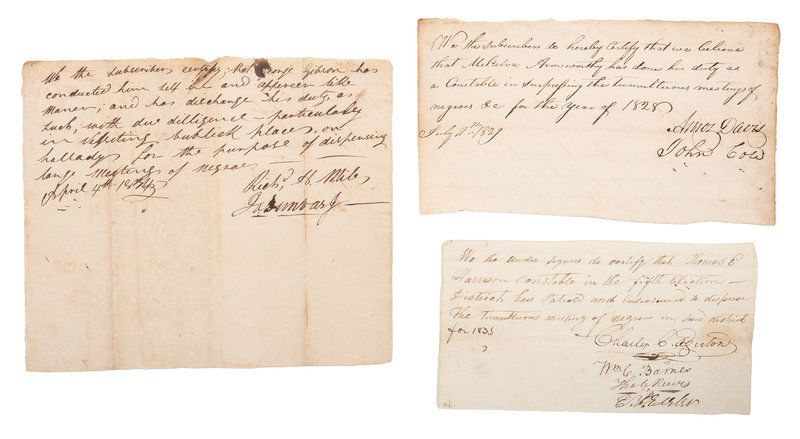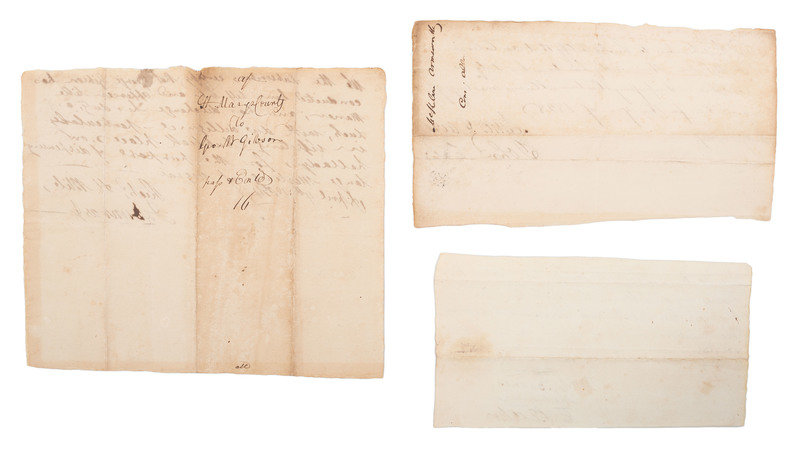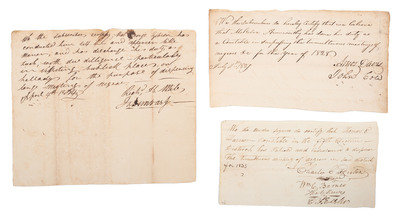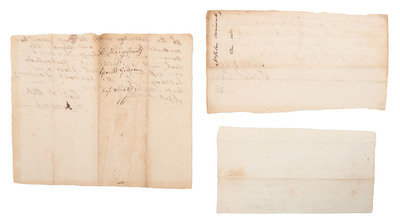Lot 32A
1p, 8 1/4 x 4 5/8 in. (toning, creasing, light soil). [St. Mary's County, Maryland]. 11 July 1829. Document signed by "subscribers" Amos Davis and John Cole certifying that they "believe that Mckelva Armsworthy has done his duty as a constable in supressing the tumultuous meetings of negroes &c for the year of 1828."
Mckelva Armsworthy (ca 1800-1854) was born in St. Mary's County, Maryland, and spent his entire life in the county. An 1831 slave register records him enslaving three individuals, a number which had increased to 11 enslaved persons by the time of the 1850 Federal Census.
[With:] 1p, 7 1/4 x 3 7/8 in. (dampstaining, creasing, small pencil notation in bottom left corner). [St. Mary's County ?, Maryland]. [1834]. Document signed by four men certifying that "Thomas E. Harrison constable has Patrole and Endeavored to disperse The tumultuous meeting of negroes in said district for 1833."
[Also with:] 1p, 8 1/4 x 7 in. (creasing, toning, light soil). St. Mary's County, Maryland. 4 April 1834. Document signed by "subscribers" certifying that constable George Gibson has discharged his duty "with due diligence - particularly in visiting publick places on hallady for the purpose of dispersing large meetings of negroes." Docketed in part on verso "St. Marys County / to Geo. Gibson."
In 1723 an act was passed in Maryland to prevent "tumultuous meetings of negroes and other slaves" on Sabbath and other holidays, requiring the appointment of constables to visit monthly all gathering places suspected of allowing African Americans to freely meet. If and when "negroes or other slaves" were found upon a premises to which they did not belong or were found in "tumultuous assembly," the supposed offenders could be whipped, fined, forced to pay penalty in property, or imprisoned. Additional restrictions were put forth by the Maryland General Assembly to further restrict the rights of both enslaved and free African Americans to congregate, as well as instituting punishments for white enslavers who allowed gatherings of enslaved individuals "upon their premises." By the early 1800s, constables appointed to enforce these regulations were also given authority to deputize citizens to assist in their searches, forming "companies" or "patrols." With the power to search African American dwellings and other buildings by force, often both free and enslaved African Americans were subject to undue violence at the hands of the enforcers.



